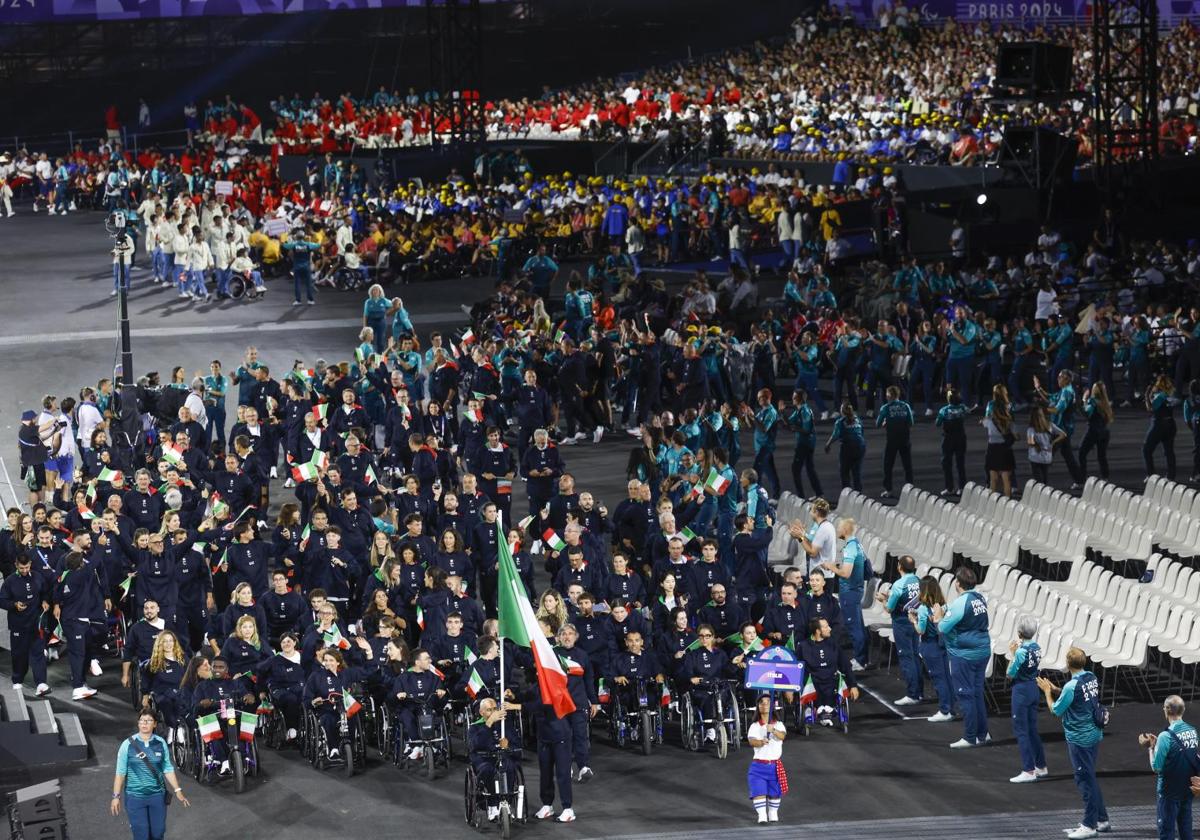

Sections
Services
Highlight

Enric Bonet
París
Miércoles, 28 de agosto 2024, 23:55
Without rain or boats on the Seine, the Paralympic Games kicked off this Wednesday afternoon with another opening ceremony in the monumental center of Paris. Athletes from 168 delegations—a record for this type of event—paraded down the Champs-Élysées to the Place de la Concorde in an open-air event, a first for the Paralympics. This marked the start of eleven days of competitions, running until September 8. Sixteen days after the end of the Olympic Games, the sporting celebration returns to the French capital.
The 17th edition of the Paralympic Games follows a formula that proved successful just a few weeks ago with the Olympics. It replicates competitions in iconic locations around Paris, such as five-a-side football for the blind next to the Eiffel Tower, para-equestrian events at the Palace of Versailles, and wheelchair fencing at the Grand Palais. It also brings back the same majestic cauldron in the shape of a hot air balloon. Even the mascot and anthem are identical. The organizers aim to place athletes with physical disabilities on par with those competing in traditional events.
To start, Paralympic athletes enjoyed a well-deserved tribute with their parade down what is known as "the most beautiful avenue in the world"—modesty is not a French virtue. Unlike July 26's Olympic opening ceremony marked by heavy rain, this time, the weather was favorable. The entry of para-athletes into Place de la Concorde, transformed into a setting akin to an Olympic stadium, took place under a splendid sunset. This provided spectacular images of the obelisk with the Arc de Triomphe in the background. Around 50,000 spectators attended the opening celebration.
One of the liveliest delegations was Spain's, dressed in beige hats and jackets and a polo shirt featuring a Picasso lithograph. Leading them were judoka Marta Arce and table tennis player Álvaro Valera. Arce, who has a 90% visual impairment due to oculocutaneous albinism, is competing in her fifth Games and aims to win her fifth Paralympic medal, having already secured two silvers and one bronze. For Valera, who has distal polyneuropathy and owns six medals, these will be his seventh and likely final Olympics.
"The Most Beautiful of Revolutions"
After two hours of para-athletes entering Concorde, concluding with the arrival of the French delegation accompanied by Joe Dassin's famous song "Les Champs-Elysées," a final segment began featuring contemporary dances and musical performances. The first act was by French singer Luc Bruyère, known artistically as Lucky Love, who was born without his left arm. This was followed by an epic rendition of La Marseillaise played on a flute.
More sober and less controversial than July 26's event—also less exciting—the conclusion was dedicated to highlighting the inclusive nature of Paralympic sport, which aims to change perceptions about mutilated or disabled bodies. "Rest assured, tonight we are not storming the Bastille or using the guillotine; instead, we are starting the most beautiful of revolutions: the Paralympic," promised Tony Estanguet, president of Paris 2024's Organizing Committee. "We want to show that differences make us more beautiful and stronger," added Andrew Parsons, president of the International Paralympic Committee.
This time there was no final performance by Céline Dion but by French artist Christine and the Queens singing Patrick Hernandez's iconic "Born to Be Alive." It was a fitting conclusion to kick off two weeks aimed at changing perceptions about sport.
Publicidad
Publicidad
Te puede interesar
Publicidad
Publicidad
Esta funcionalidad es exclusiva para registrados.
Reporta un error en esta noticia

Debido a un error no hemos podido dar de alta tu suscripción.
Por favor, ponte en contacto con Atención al Cliente.

¡Bienvenido a TODOALICANTE!

Tu suscripción con Google se ha realizado correctamente, pero ya tenías otra suscripción activa en TODOALICANTE.
Déjanos tus datos y nos pondremos en contacto contigo para analizar tu caso

¡Tu suscripción con Google se ha realizado correctamente!
La compra se ha asociado al siguiente email
Comentar es una ventaja exclusiva para registrados
¿Ya eres registrado?
Inicia sesiónNecesitas ser suscriptor para poder votar.